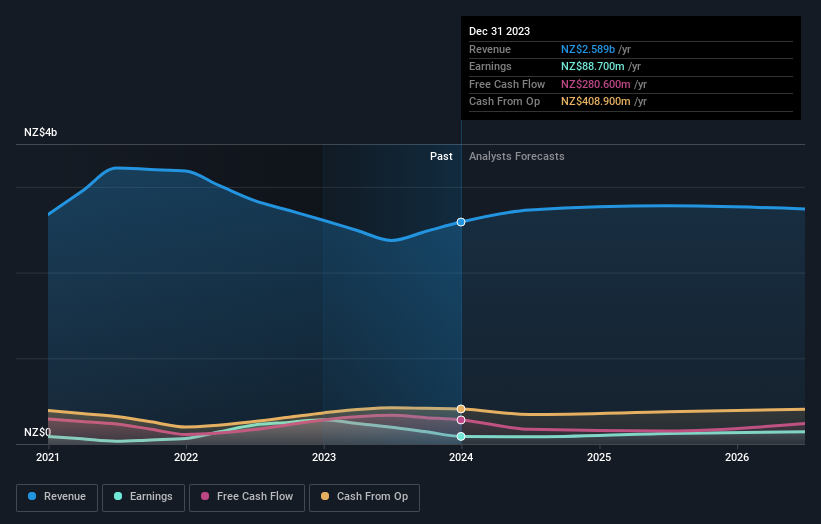Individual investors own 42% of Genesis Energy Limited (NZSE:GNE) shares but state or government control 50% of the company
Key Insights
Genesis Energy's significant state or government ownership suggests that the key decisions are influenced by shareholders from the larger public
50% of the company is held by a single shareholder (New Zealand)
Using data from analyst forecasts alongside ownership research, one can better assess the future performance of a company
If you want to know who really controls Genesis Energy Limited (NZSE:GNE), then you'll have to look at the makeup of its share registry. With 50% stake, state or government possess the maximum shares in the company. That is, the group stands to benefit the most if the stock rises (or lose the most if there is a downturn).
Individual investors, on the other hand, account for 42% of the company's stockholders.
Let's take a closer look to see what the different types of shareholders can tell us about Genesis Energy.
View our latest analysis for Genesis Energy
What Does The Institutional Ownership Tell Us About Genesis Energy?
Institutional investors commonly compare their own returns to the returns of a commonly followed index. So they generally do consider buying larger companies that are included in the relevant benchmark index.
Genesis Energy already has institutions on the share registry. Indeed, they own a respectable stake in the company. This suggests some credibility amongst professional investors. But we can't rely on that fact alone since institutions make bad investments sometimes, just like everyone does. It is not uncommon to see a big share price drop if two large institutional investors try to sell out of a stock at the same time. So it is worth checking the past earnings trajectory of Genesis Energy, (below). Of course, keep in mind that there are other factors to consider, too.
Hedge funds don't have many shares in Genesis Energy. Our data shows that New Zealand is the largest shareholder with 50% of shares outstanding. This essentially means that they have extensive influence, if not outright control, over the future of the corporation. The Vanguard Group, Inc. is the second largest shareholder owning 1.7% of common stock, and JPMorgan Chase & Co, Private Banking and Investment Banking Investments holds about 1.3% of the company stock.
Researching institutional ownership is a good way to gauge and filter a stock's expected performance. The same can be achieved by studying analyst sentiments. Quite a few analysts cover the stock, so you could look into forecast growth quite easily.
Insider Ownership Of Genesis Energy
The definition of an insider can differ slightly between different countries, but members of the board of directors always count. The company management answer to the board and the latter should represent the interests of shareholders. Notably, sometimes top-level managers are on the board themselves.
Insider ownership is positive when it signals leadership are thinking like the true owners of the company. However, high insider ownership can also give immense power to a small group within the company. This can be negative in some circumstances.
Our information suggests that Genesis Energy Limited insiders own under 1% of the company. It is a pretty big company, so it would be possible for board members to own a meaningful interest in the company, without owning much of a proportional interest. In this case, they own around NZ$10m worth of shares (at current prices). Arguably, recent buying and selling is just as important to consider. You can click here to see if insiders have been buying or selling.
General Public Ownership
The general public, who are usually individual investors, hold a 42% stake in Genesis Energy. This size of ownership, while considerable, may not be enough to change company policy if the decision is not in sync with other large shareholders.
Next Steps:
While it is well worth considering the different groups that own a company, there are other factors that are even more important. Like risks, for instance. Every company has them, and we've spotted 4 warning signs for Genesis Energy (of which 1 doesn't sit too well with us!) you should know about.
Ultimately the future is most important. You can access this free report on analyst forecasts for the company.
NB: Figures in this article are calculated using data from the last twelve months, which refer to the 12-month period ending on the last date of the month the financial statement is dated. This may not be consistent with full year annual report figures.
Have feedback on this article? Concerned about the content? Get in touch with us directly. Alternatively, email editorial-team (at) simplywallst.com.
This article by Simply Wall St is general in nature. We provide commentary based on historical data and analyst forecasts only using an unbiased methodology and our articles are not intended to be financial advice. It does not constitute a recommendation to buy or sell any stock, and does not take account of your objectives, or your financial situation. We aim to bring you long-term focused analysis driven by fundamental data. Note that our analysis may not factor in the latest price-sensitive company announcements or qualitative material. Simply Wall St has no position in any stocks mentioned.

 Yahoo Finance
Yahoo Finance 

